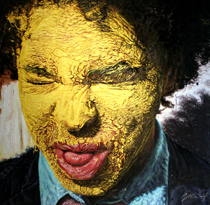Malcolm X: A Life of Reinvention
By Manning Marable
Penguin, 2011
608 pp. $18
It was a sunny day, Monday, February 22, 1965, and I was in Kindergarten, in Halifax, NS, when other “Negro†or “Coloured†kids (as we were called back then), announced, “Malcolm X got shot.†True: The Pan-Africanist and Muslim orator had been assassinated in New York just the day before, but the strange surname is what caught my childish attention.
It wasn’t until high school that I began to understand the importance of the African-American agitator and Islamic evangelist, and also finally read The Autobiography of Malcolm X (1965), as told to Alex Haley. X’s evolution from disappointed student to Malcolm Little, to Detroit-Boston-New York gangster “Detroit Red,†to Nation of Islam firebrand, to, finally, El-Hajj Malik El-Shabazz, is more than a tale of self-invention and transformation. It is also a how-to-guide for speaking political truth, articulating black identity, and fashioning new styles of black masculinity: The first major black hero to wear glasses, X made intellectualism “cool,†not wimpy.
In Malcolm X: A Life of Reinvention, Columbia University history professor Manning Marable sets out to clear the myths and misconceptions about X, and render his life and importance as plainly as scrupulous scholarship allows. Marable declares that he wanted to “deconstruct†X’s Autobiography, to separate facts from convenient fiction. Combing through X’s Diary, police surveillance files, Nation of Islam papers, and little-referenced newspapers from Africa, the Middle East, and Europe, plus utilizing interviews with survivors and contemporaries, Marable succeeds in recreating X’s life with its captivating contradictions, stressful challenges, and successes—personal and socio-political.
Though X became, in death, a symbol of radical black nationalism and black power (and Marable credits X correctly with influencing the development of the Black Panther Party and of black cultural and “consciousness†movements in mid-1960s and later), Marable positions him as having been, more meaningfully, an exponent of “modern … Pan-Africanism, based on a global antiracism,†as well as a bridgehead (or beachhead) between Americans and Muslims. Marable also admires X for advocating the importance of the black bloc vote, while also deploring his frequent suggestions that there were no parties worth voting for.
Marable distinguishes nicely the different contributions of X and Dr. Rev. Martin Luther King to the drive toward full citizenship rights for African Americans in the 1950s and 1960s. But he never states explicitly the major distinction: King’s movement secured the right-to-vote, and that strategic success allowed for general black empowerment. But X’s cultural preaching, so to speak, transformed “Negroes,†“Coloureds,†and “Blacks†into African Americans (and African Canadians); that crucial shift wedded self-affirmation to self-determination. While Marable explores the meaning of X’s life, he also does correct major omissions and fabrications in the Autobiography. Carefully sifting the evidence, he argues, credibly and convincingly, that Detroit Red was no glamorous hood, but a penny-ante crook, who stole his own sister’s fur coat and “snitched†on his friends.
Moreover, though he later seemed ascetic and condemned “vice,†in his “hood†days, X likely was bisexual, and derived some income from a white male lover. In the Autobiography, X’s sister, Ella, seems a solid citizen. In Marable’s bio, she is a store detective turned shoplifter. Too, X’s marriage was no courtly black romance. It was so full of sexual tensions that, if gossip and innuendo are believed, by the last year of his life, both X and his wife, Betty, found pleasure with others. Importantly, Marable reconstructs X’s African and Middle Eastern travels to reveal that these journeys inspired the humanist and socialist tendencies in his mature thought.
Marable terms X a “misogynist,†and his rhetoric was also, at times, simply racist and anti-Semitic. Given to making extreme statements, X helped to trigger his own murder by provocatively denouncing the Nation of Islam. Yet, his faults do not cancel his accomplishment, which was to reconnect African North Americans with Africa—“by any means necessary.â€
Certainly, if U.S. President Barack Obama seems currently only a slightly more successful version of one-term, U.S. President James Earl Carter III (1977-1981), he came into office with an analytical world-view that owed more than a little to X. He might yet fashion a great presidency if he remembers one lesson of that analyst: Foes – Wall Street, the Republican Party, etc. – merit defeat, not debate.






Hi Professor Clarke,
It’s been a long time since Modern Canadian Poetry! I wanted to ask you a question about your opening line- perhaps it’s more about defining mystical and intellectual from a poetic perspective-
How do you define the poetry of Rumi, Hafez and other sufi poets? They defy the ‘intellectual’ term– would you call them ‘mystical’ or ‘sentimental’- or are they accessible enough to not be defined as either ‘intellectual’ or ‘mystical’, despite being rooted in a mystical tradition?
Hope you’re doing really well!